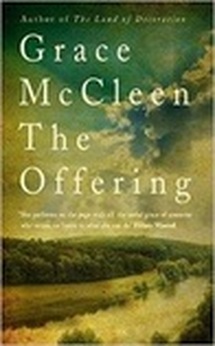| Two and half months short of her thirteenth birthday, Madeline sets off with her parents for a new life on an unnamed island. With no job organised, and no real plan other than to spread the word of God amongst the neighbours, it seems that their faith has been rewarded when they discover a dilapidated farmhouse, with a garden somewhat reminiscent of the picture of Eden in the family Bible. Over the course of that first summer, life is idyllic, as the father finds short-term work and Madeline is home-schooled by her mother, leaving lots of time to roam the countryside with her dog. But, as the chill winds of autumn approach, it seems that their luck – or God’s protection – is running out. Madeline watches with anxiety as her father is refused work, her mother sinks into depression, their stores run low and the house falls into disrepair. Yet, as she records in her diary, she isn’t completely helpless; perhaps, as in the Old Testament, a sacrifice will make God look upon them favourably once more. |
This is the journal of my fourteenth year. It hasn’t really begun but I already know it will be the best year of my life. My task this year is to find You. The blazing arc of the sky tells me it is possible, the hills say it too, the fields swallowed up in the afternoon sun nod their heads … We have come to this place that it seems to me You have made for us. We were obedient so You remembered us. You remembered Your covenant.
I particularly admired the way in which the girl’s incipient sexuality is transformed into something quite different by her religious belief. The proselytising and tightness of the mother-daughter bond was reminiscent of Jess in Motherland, and the religious self-assurance of Zippy in A Song for Issy Bradley. But the framing of Madeline’s teenage crisis within the dangerous relationship between a psychiatrist and his patient worked less well for me, despite the parallels between the godlike status of both her father and Dr Lucas.
The reader is first introduced to Madeline as a woman in her mid-30s, confined to a psychiatric hospital for the past twenty-one years. She suffers from some form of chronic fatigue syndrome, which she interprets as “an expression of disgust” (p81), with occasional brief “psychotic breaks” characterised by acts of violence of which she has no memory. I found it hard to believe that a fourteen-year-old girl would be admitted and detained there “in an asylum for the mentally insane in the heart of the English countryside” (p172) at a time when there was an active policy to reduce the long-stay hospital population. (With the electric fence, straitjacket and outmoded language – it’s possible that Madeline was being ironic in referring to herself as “an inmate” (p80) but I could envisage the kindly nurses being upset at her use of the term – I imagined some kind of Soviet re-education camp.) Still, some of the interactions between the patients were engaging, with more staff involvement than in Jamie Mollart’s imagined psychiatric ward.
The intractability of her problems serves as a challenge to the new psychiatrist. Dr Lucas imposes his treatment programme upon her (and the surprisingly passive nursing team): regular sessions of hypnosis, graded exercise and a thought diary – which he seems to think is all there is to CBT – which, despite her reluctance, Madeline is unusually capable of completing without much instruction or support (p82). Dr Lucas believes that recovering her memory of what happened on the island will be the key to her recovery, as well as sealing his own reputation; I would have found it more satisfying when he’s proved wrong if the setup were more credible.
Since Madeline refers to this intervention as therapy (p67), I pondered including this review in my series on fictional psychotherapists, but decided against on the basis that the author herself probably wouldn’t see Dr Lucas that way. But it’s possible I’m being extra hard on this character because of my fondness for a real-life (though now deceased) Dr Lucas, psychiatrist and psychotherapist, whose paper on the psychotic wavelength was genuinely ground-breaking in its time.
The Offering is Grace McLean’s third novel. Thanks to Sceptre books for my review copy.
While I might not appreciate his methods, I agree with Dr Lucas that madness can be a refuge from a reality that can’t be borne. Of course, it’s a refuge that generates other problems, which might not be what Charli had in mind when she set her latest flash fiction challenge. Mindful that I’ve not only neglected to exercise my flash muscles lately, I’m way behind Charli in revising last year’s non-Nano project (in the sense that she’s got research coming out of her ears, while I haven’t even looked at my fast first draft,
| I thought I’d resurrect Matty, a long-stay psychiatric hospital patient who believes she lives in a stately home. I did bring her out to play several months ago when, in another 99-word story, in which community care seems to promise renewal and refuge. But here she is being quizzed by some visitors. I’m not sure how easy it will be to see what’s going on, but here’s a clue: her interlocutors aren’t journalists. |
What year is it? Who is the Prime Minister? Where did I live before I came here? I merely smile as they scribble in their files.
The Butler brings tea. I offer them a jelly baby. If they choose a yellow one, I will let them see a picture of the boy.























 RSS Feed
RSS Feed





















